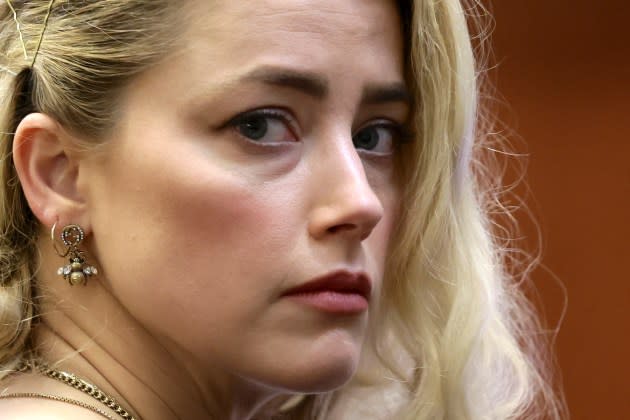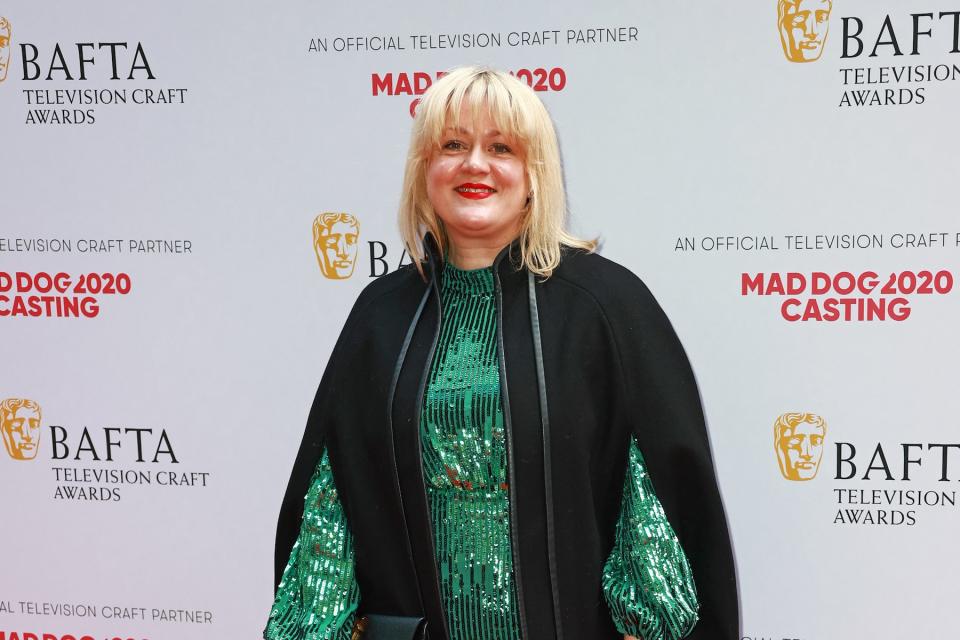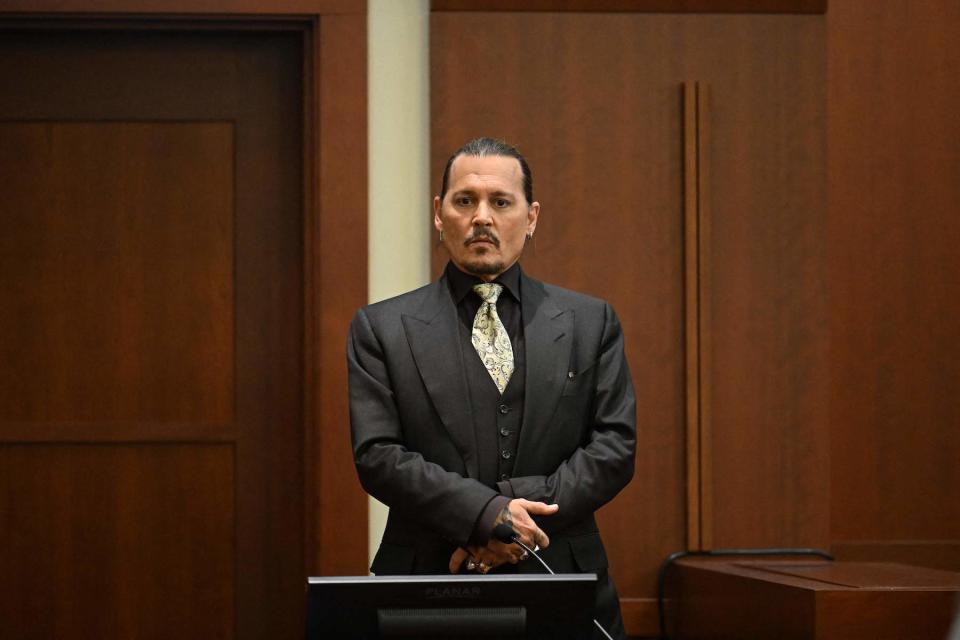‘Depp v. Heard’ Director Defends Her Divisive Netflix Docuseries
- Oops!Something went wrong.Please try again later.

It’s been called the first “Trial by TikTok.” Over the course of six-plus weeks, John C. Depp, II v. Amber Laura Heard, concerning allegations of defamation between actor-exes Johnny Depp and Amber Heard, was held in Virginia — and broadcast live to the world. Depp’s legion of supporters subsequently wielded the influence of the internet in their favor, circulating a never-ending barrage of clips on TikTok, Instagram, YouTube, and other social media platforms that cast Depp in a good light and Heard in a poor one.
The trial, and the surrounding noise, is examined in Emma Cooper’s three-part docuseries Depp v. Heard, which is edited to display the two stars’ testimonies side-by-side, and is now streaming on Netflix.
More from Rolling Stone
Justin Timberlake Might Not Be as Innocent as He Seems in Mysterious 'Reptile' Trailer
The Fugitive Nissan CEO Smuggled Out of Japan in a Music Box
Prince Andrew's Jeffrey Epstein Ties Explored in 'Secrets of Prince Andrew'
“I think this trial was the first one that showed how awful it can be and how dangerous it is, but I don’t think we can argue for the genie to be put back in the bottle,” Emma Cooper tells Rolling Stone.
You likely know the broad strokes: Depp brought a defamation case against Heard in Virginia over a Washington Post op-ed with her byline wherein she referred to herself as “a public figure representing domestic abuse” who spoke up against “sexual violence.” Heard then countersued for defamation. She’d previously been granted a temporary restraining order in 2016 after filing for divorce from Depp, and publicly accused him of abuse. Depp proceeded to sue News Group Newspapers Ltd. over a Sun article that branded him a “wife-beater” and lost, with the judge ruling, “I have found that the great majority of alleged assaults of Ms. Heard by Mr. Depp have been proved to the civil standard.” And so Depp went to Virginia, where neither of them have ties — and the Washington Post is not based, only housing some servers there — to clear his name, since the state has some of the weakest anti-SLAPP laws in the country protecting people against defamation claims.
The jury ultimately ruled in Depp’s favor, finding Heard liable on three counts of defamation and granting him $10.35 million in damages (and Heard $2 million in damages for one count of defamation). The two parties settled in December 2022, with Heard paying Depp $1 million.
Depp v. Heard has come under fire from both the pro-Depp and pro-Heard camps, and Cooper, who is a former news producer with Vice and the BBC and is responsible for the recent documentaries The Mystery of Marilyn Monroe: The Unheard Tapes and Epstein’s Shadow: Ghislaine Maxwell, is adamant that the docuseries takes a measured, balanced approach to the trial.
“There was a verdict. We’re not trying to rewrite history here, and I am not a lawyer,” she says. “We wanted to make sure that we maintained our integrity and balance throughout.”
She adds, “I’m BBC-trained, man. I’m not trained to have an opinion. Even though Depp v. Heard is directed by me, it is not an authored piece. I’m so ingrained to be balanced while trying to say something about the world, and that’s what I was trying to do. It’s about popular culture, really.”
In an interview with Rolling Stone, Cooper discussed the polarizing docuseries and why she made it.
What inspired you to make Depp v. Heard?
It came out of my own obsession with watching the live feed and my own viewing habits around it. I got totally sucked in. I was watching it all the time. I was watching it on the side, while I was on Zoom. And at the end of the day, I would talk to all my friends about it and everybody had different opinions. I was weirded out by my own behavior, I think, and started thinking, “Dare I tell Netflix that I really want to do this?” And then I told Netflix, “I don’t want to do any interviews.” And they just let me do it.
Why did you choose to go that route and forgo doing any interviews?
I’m super interested in human behavior — and by that I mean myself included. I love TikTok. My screen time weekly, when you get that alert, is absolutely fucking horrible. I wanted to keep it away from experts. Who are these “experts?” I didn’t want to talk to psychologists or anything like that. I wanted to keep it very pure in the world that we were in while we were watching [the trial]. I didn’t want to break the seal, and it was quite a hard thing to do because then I had to talk about the things that I wanted to talk about but use the experience at the time to tell that story. A directorial “take” is in there, but maybe not everybody can get to it.
What is the directorial take?
Well… It’s really, really hard to figure out what the truth is of anything at the moment, and I was really interested in two people who vehemently believe their own truths, but they both said different things about that truth. I spent a lot of time with the editors banging on about how there are three truths: your truth, my truth, and god’s truth — or the overseeing eye. In today’s media, everyone can have an opinion, and it’s really hard to figure out what the truth might be. I was fascinated by this trial and looking at those difficult moral and social questions in our society. I believe in the democratization of facts and of social media. I think it’s an absolutely amazing thing that everybody can have an immediate opinion about anything, but it makes it complicated to get to the truth.

I read some criticisms of Depp v. Heard from TV critics that accused it of placating the pro-Depp crowd because you gave airtime to a number of odious and exploitative pro-Depp content creators, when it seemed to me like the docuseries was using the “sunlight is the best disinfectant” approach in showing how ridiculous and opportunistic these people were.
Yeah. There were some reviewers who obviously hadn’t gotten to the end. What becomes quite meta about the process and about this series, which I kind of knew would happen, is that some people watch it and think it’s pro-Depp. The same people will watch it again and think it’s pro-Heard. Some people will think it’s a formless jumble of clips. It’s pretty wild. And I think it’s what we’re trying to reflect: It depends who you are, what kind of person you are, and your thought process. The amount of hate on my socials is about fifty-fifty. It’s incredibly balanced.
I’m surprised to hear that it’s been balanced because the pro-Depp crowd is a lot more militant online, and reports indicate that much of it is not organic.
It’s really interesting. I haven’t spoken to other journalists about this, but I’m going to speak to you about it, because I’m so terrified of being quoted as being unbalanced, because I was in one article in England. Somebody quoted something I said about being a woman and being a feminist, but they didn’t quote everything I said about that, and pro-Heard fans — which were quite hard to find in the process of making this series because it was out of balance — they really went for me after the Channel 4 airing in England, but it’s been the pro-Depp people who have come after me on my social media after the Netflix. I’ve had feminists say, “Shame on you, you fucking bitch,” and I’ve had Depp fans go, “You’re a fucking bitch.” So, it’s really equal in the “fucking bitch”-ness. I’ve tried to be balanced and truthful in the things that we found out.
It’s been called the first “Trial by TikTok.” And during the trial, it seemed like nearly all of the clips being circulated on TikTok were pro-Depp that made him look good or made Heard look bad. There were a number of Heard clips that were doctored to make her look bad, and even wacky theories accusing her of doing cocaine on the stand. It did seem like TikTok and social media were weaponized far more in one person’s favor than the other.
Yes. One hundred percent. It was quite hard to find the pro-Amber material, honestly. We made a point in the series that we found it hard. But on TikTok, everyone is the main character now. It’s an amazing medium, and I even I myself start conversations now with, “I saw this thing on TikTok…” Although the thing I’m watching is hamsters doing a rave.

Depp v. Heard focuses on a handful of allegations during the trial. There was obviously a lot of ground to cover here, so why did you decide to narrow the scope to these?
When I came into it, I said to the team: Tell me four or five moments which have gotten the most socials around them, so it was quite data-driven. Then, I looked to those moments and went back to the source material. I was led by the noise of the people. We then looked at the actual facts and primary materials — if there were documents, sources. I always tell people that they have to look at the sources of the things they’re TikToking about. I thought it was interesting to deconstruct the things that people were talking about the most, like the poo, the “mega pint,” etc.
The attitude toward Heard appeared to shift after the 6,000-plus pages of pre-trial documents were unsealed following the verdict. I’m curious if your attitude shifted at all too, since the release of these docs, and the information within them, does serve as a coda of sorts to the doc.
I know it sounds boring, but I’m always like, “Go back to the documents, man. Whatever your opinion, go read it yourself.” Look at the source material. And I do say that people went a bit quieter for a moment, didn’t they? When Camille [Vasquez, Depp’s lawyer] went on TV the other day and said she thought the film was “really balanced,” the noise went quieter on me. And she’s obviously an intelligent lawyer and thought what I was trying to do was fair.
You’re from the U.K., and there was a different trial there with a different result. The U.K. trial had a bunch of information in it that was omitted from the Virginia trial. How would you compare the two trials? And do you feel the Virginia trial was a fair trial?
I think they were both really thorough, actually. And I never got to speak to a juror, even though I tried, so I don’t feel that I can say anything other than that it was a fair trial and that they were not affected by the socials and kept it in the court, because I can’t evidence anything other than that. And I don’t think the trial shakes the foundation of your justice system. I think it just says to all of us, “Gosh, we’ve got a responsibility here, and this whole trial was a pretty sad thing about two quiet, sad figures who probably didn’t want to say all of those things in front of all these people.”
Do you feel that this trial was a setback for women — particularly those who intend to come forward with allegations of abuse? We’ve obviously seen Amber Heard be raked over the coals during the course of this trial and its aftermath.
I sort of see it as slightly separate from #MeToo, actually. I see it as a Hollywood trial, and I don’t think anybody would say that it was a positive step forward for #MeToo and for women being listened to, but I do think people see it as quite a celebrity-bubble kind of thing. We’re constantly making steps forward in the believability of women and constantly making steps back, so did it completely help anything in #MeToo? No. Did it completely regress it? I don’t think so, either. It was so incredibly complex and there were allegations on both sides, so it wasn’t such a #MeToo trial, actually.
Best of Rolling Stone

